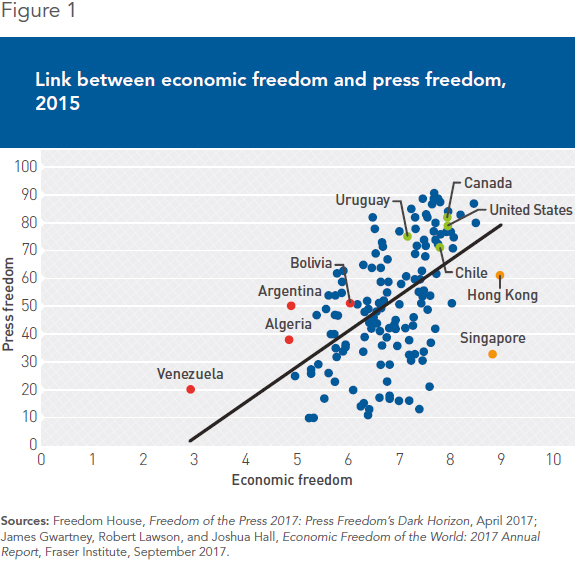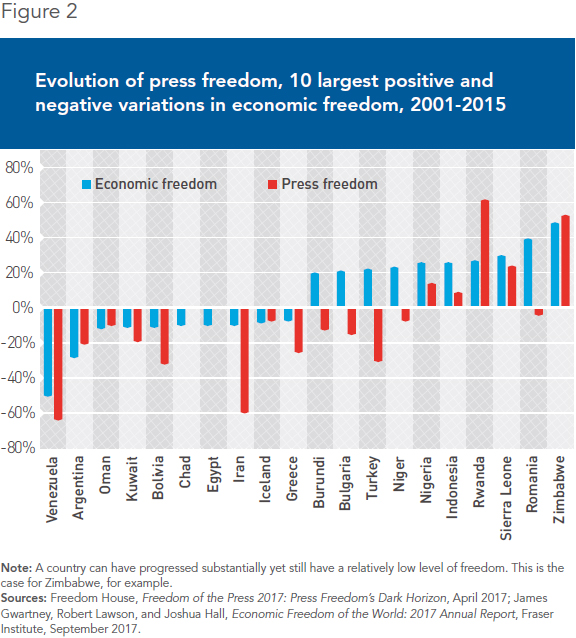Economic Freedom Promotes Freedom of the Press

The virtues of press freedom are widely recognized today. Economic freedom, another essential liberty, is for its part underappreciated. Yet it makes a substantial contribution to the improvement of human well-being, in addition to which it is a necessary condition for ensuring a certain degree of press freedom.
Media release: No free press without economic freedom!
 Related Content
Related Content
 |
 |
 |
| Freer Markets, Freer Media (The Wall Street Journal, May 2, 2018)
Liberté économique et liberté de presse vont de pair (Le Devoir, May 3, 2018) « La liberté de la presse est indissociable de la liberté économique » (Le Point, May 3, 2018) |
This Economic Note was prepared by Kevin Brookes and Patrick Déry, Public Policy Analysts at the MEI. The MEI’s Regulation Series aims to examine the often unintended consequences for individuals and businesses of various laws and rules, in contrast with their stated goals.
The virtues of press freedom are widely recognized today. It strengthens democracy by raising the expectations of citizens, by forming a “fourth estate” or “power” distinct from the three powers of government,(1) and by reducing corruption.(2) It is also conducive to economic development, facilitating the circulation of information that is indispensable to economic actors.
Economic freedom, another essential liberty, is for its part underappreciated. Yet it makes a substantial contribution to the improvement of human well-being,(3) in addition to which it is a necessary condition for ensuring a certain degree of press freedom.
Two Freedoms That Go Hand in Hand
Economic freedom implies the possibility of choosing among goods and services and engaging in voluntary exchange with others in a competitive market. Governments favour economic freedom when they provide a legal framework ensuring the respect of property rights and the enforcement of contracts. They impinge upon it when they replace the market coordination of economic activities with regulations and restrictions on trade and entrepreneurship.(4)
Press freedom is an essential component of a democracy in which individual rights and freedoms are respected. It constitutes one of the countervailing powers to those of the government and helps civil society to organize itself and make its voice heard. It implies that journalists can practise their profession unhindered.
Press freedom emerged fairly recently in human history, and its birth is closely linked to the development of the market economy. The first regularly published newspaper was printed in 1605 by entrepreneurial printer Johann Carolus from Strasbourg in order to reproduce the news that was circulated by German postal services. He was responding to a growing demand for information, providing a low-cost service made possible by the invention of the printing press.
This service could be provided independently of the decrees of kings and queens thanks to the risks taken by entrepreneurs—often booksellers—who helped spread critical thinking throughout Europe, which in turn favoured political emancipation.(5)
A Market for Ideas
Nobel laureate Ronald Coase explained that ideas are goods like other goods and that there is a market for ideas with producers and consumers. As in any market, certain producers are honest and others are dishonest, but regulators are human beings like everyone else, susceptible to the influence of pressure groups and with personal motives of their own. It is therefore dangerous to want to regulate this market since the regulators are not necessarily best suited to determine which are the best ideas.(6)
The link between economic freedom and press freedom was established more formally by two other Nobel laureates, Milton Friedman and Friedrich Hayek.(7) They showed that reducing economic freedom necessarily entailed a reduction in civil and political rights such as the freedom to express one’s ideas. Indeed, as Hayek wrote, “[W]hoever controls all economic activity controls the means for all our ends.”(8) Conversely, a certain level of economic freedom is necessary to ensure the sustainability of a stable democratic system: A market economy lets each person earn income allowing him or her to make decisions independent of political leaders.
For as long as measures of economic and political freedom have existed, there has never been a case of a democratic society that respects individual rights without at least a minimum of economic freedom.(9) The free market, by ensuring a separation of economic and political power, is a guarantor of freedom of expression: It allows for competition between the buyers and sellers of information and ideas, which guarantees pluralism.(10)
In a real market economy, an avid defender of socialism will always have the possibility of finding donors, investors, and clients to finance the dissemination of his or her opinions. However, in an economy controlled by the government, a political dissident will have greater difficulty expressing his or her opinions because of the bureaucratic authorizations required, the difficulty of finding independent financing, or simply because of government-imposed censorship.
The degree of government control over the economy necessarily has an impact on those who produce information. A good way to silence a newspaper, a television station, or a website is to tax it or to regulate it strictly. The freer a country is economically and the more it facilitates the entry of new actors onto the market (which means fewer regulated professions and fewer barriers of any kind), the greater the chance that the press will be free. What is good for companies in general is also good for news organizations. The validity of these principles has been confirmed in the real world.
A Strong, Significant Link
Two studies looking at the contemporary situation have shown that the level of press freedom is connected to the level of economic freedom.(11) According to the first, 71% of those countries with the most economic freedom also provide a high degree of press freedom, explained in particular by openness to foreign markets and respect for property rights. The second study, for its part, revealed that greater economic control of the media by government is associated with less freedom for journalists.
The degree of press freedom and economic freedom can also be analyzed using two indices that have measured these variables over more than twenty years. The first index, from the Fraser Institute’s Economic Freedom of the World report, takes into account the size of government, the legal system and property rights, the soundness of the currency, the freedom to trade internationally, and regulation.(12) The second, from Freedom House’s Freedom of the Press report, takes into account the political, economic, and legal contexts that influence the work of journalists.(13)
The cross-referencing of these two indices for the year 2015 confirms the result of the studies mentioned above. In general, the more economically free a country is, the more press freedom exists there (see Figure 1). The connection is statistically significant and strong, with a one-point (out of ten) increase in economic freedom entailing on average a fourteen-point (out of 100) increase in press freedom.(14)

This describes, for example, the countries of Western Europe and North America, but also certain Latin American countries like Chile and Uruguay. Conversely, countries with a low level of economic freedom, like Venezuela, Bolivia, Argentina, and Algeria, also have a low level of press freedom.
Certainly, a high degree of economic freedom does not by itself guarantee more press freedom.(15) For example, Singapore and Hong Kong (in yellow in Figure 1) enjoy a high level of economic freedom, but a low level of press freedom. However, it is clear from the data that a minimum level of economic freedom is a necessary precondition to ensuring a minimum level of press freedom: No country with a free press is in the bottom quartile in terms of economic freedom. This is moreover a causal link: The degree of economic freedom for a given year explains in large part the degree of press freedom of the following year, and not the other way around.(16)
If we look at the five sub-indicators of economic freedom, the protection of property rights and the freedom to trade internationally(17) are the two that are most conducive to press freedom,(18) as also noted in one of the studies cited above. Economic freedom also has more of an effect among countries that are less economically free than among the freest countries.(19)
The link between economic freedom and freedom of the press is stronger in low- or lower-middle-income countries than in high-income countries.(20) In other words, economic freedom is even more conducive to press freedom in poorer countries.
Two Freedoms That Evolve Together
The connection between economic freedom and press freedom at a given point in time is established. What about the evolution of the two indices over a given period? Of the 111 countries examined, only 25 experienced an increase in press freedom between 2001 and 2015. But among this select group, a very large majority (19) also experienced an increase in economic freedom.
Furthermore, eight of the ten countries having experienced the largest decreases in economic freedom also experienced a decrease in press freedom (see Figure 2). The relationship is weaker in the other direction: Only half of the countries having experienced the largest increases in economic freedom also experienced an increase in press freedom.

It can also be observed that the governments of certain South American countries, by increasing their control and regulation of the economy during the same period, have contributed to sharp reductions in press freedom.(21)
The conclusions about the nature of the link between economic freedom and press freedom are the same if we cross-reference the Economic Freedom of the World index with another indicator of press freedom prepared by Reporters without Borders for each of the years from 2004 to 2015.(22) In other words, in places with a high degree of economic freedom, fewer journalists are attacked, fewer laws and regulations are imposed on the media, and there is less political pressure to control content.
Conclusion
There is a lot of room for improvement when it comes to freedom of expression and the independence of journalists around the world, as the Freedom House and Reporters without Borders reports regularly point out. Such improvement can be accomplished through economic liberalization. Indeed, many of the countries where significant progress could be achieved suffer from a lack of economic freedom.
Even though other factors, like the political system, influence the independence of journalists, and even though economic freedom is not sufficient by itself to guarantee press freedom, it nonetheless remains a necessary condition. Economic freedom therefore constitutes one promising avenue of reforms, as it favours prosperity while also favouring non-economic factors—above all, freedom of the press.
References
1. The executive, the legislative, and the judiciary powers.
2. Timothy Besley and Robin Burgess, “The Political Economy of Government Responsiveness: Theory and Evidence from India,” The Quarterly Journal of Economics, Vol. 117, No. 4, November 2002, pp. 1415-1451; Aymo Brunetti and Beatrice Weder, “A Free Press Is Bad News for Corruption,” Journal of Public Economics, Vol. 87, Nos. 7-8, 2003, pp. 1801-1824.
3. Marie-Josée Loiselle and Pascale Déry, “Economic Freedom and the Well-Being of Women around the World,” Viewpoint, MEI, March 2016; Yanick Labrie and Bradley Doucet, “Economic Freedom Improves Human Well-Being,” Economic Note, MEI, February 2015; Ariel R. Belasen and Roger W. Hafer, “Do Changes in Economic Freedom Affect Well-Being?” Journal of Regional Analysis & Policy, Vol. 43, No. 1, 2013, pp. 56-63; Niclas Berggren, “The Benefits of Economic Freedom: A Survey,” Independent Review, Vol. 8, No. 2, Fall 2003, pp. 193-211.
4. James Gwartney and Robert Lawson, “The Concept and Measurement of Economic Freedom,” European Journal of Political Economy, Vol. 19, No. 3, September 2003, pp. 406-407.
5. Johannes Weber, “Strassburg, 1605: The Origins of the Newspaper in Europe,” German History, Vol. 24, No. 3, July 2006, pp. 387-412; Eric W. Allen, “International Origins of the Newspapers: The Establishment of Periodicity in Print,” Journalism Bulletin, Vol. 7, No. 4, December 1930, pp. 307-319.
6. Ronald H. Coase, “The Market for Goods and the Market for Ideas,” The American Economic Review, Vol. 64, No. 2, May 1974, pp. 384-391.
7. Friedrich Hayek, The Road to Serfdom, Chapter 7 – Economic Control and Totalitarianism, Routledge, 2006 [1944]; Milton Friedman, Capitalism and Freedom, Chapter 1 – The Relation Between Economic Freedom and Political Freedom, University of Chicago Press, 1962.
8. Friedrich Hayek, ibid., p. 95.
9. Robert A. Lawson and J. R. Clark, “Examining the Hayek–Friedman Hypothesis on Economic and Political Freedom,” Journal of Economic Behavior & Organization, Vol. 74, No. 3, June 2010, pp. 230-239.
10. Milton Friedman, op. cit., endnote 7.
11. Christian Bjørnskov, “The Hayek–Friedman Hypothesis on the Press,” Journal of Institutional Economics, forthcoming; Simeon Djankov et al., “Who Owns the Media?” The Journal of Law and Economics, Vol. 46, No. 2, October 2003, pp. 341-382.
12. James Gwartney, Robert Lawson, and Joshua Hall, Economic Freedom of the World: 2017 Annual Report, Fraser Institute, September 2017.
13. Freedom House, Freedom of the Press 2017: Press Freedom’s Dark Horizon, April 2017.
14. See Figure A-1 in the Technical Annex on the website of the MEI for an illustration of the same connection using all of the data from 2001-2015.
15. Economic freedom explains 35% of the variation in the index of press freedom for the set of data covering the 2001-2015 period. See Figure A-1 of the Technical Annex.
16. See the methodological explanations in the Technical Annex.
17. The three others are the size of government, sound money, and amount of regulation.
18. See Figures A-3 and A-4 of the Technical Annex. See also Christian Bjørnskov, op. cit., endnote 13; Nabamita Dutta and Sanjukta Roy, “The Impact of Foreign Direct Investment on Press Freedom,” Kyklos, Vol. 62, No. 2, April 2009, pp. 239-257.
19. See Figure A-5 of the Technical Annex.
20. According to the World Bank’s classification system. World Bank, Data, How Does the World Bank Classify Countries? Income groups. See Figures A-7 to A-9 of the Technical Annex.
21. For example, Venezuela has experienced substantial reductions in both economic and press freedom, of 50% and 64% respectively, according to the Fraser Institute and Freedom House indices. Hugo Chavez and Nicolas Maduro have indeed used economic tools to muzzle the opposition press by investing massively in government media to spread the government’s voice, by not renewing the licence of an opposition television station, and by using fines and economic incentives to censor private media. See The Economist, “A Crackdown in Venezuela: News That’s Fit to Print,” October 19, 2013; Boris Munoz, “The Media and the Citizen in Venezuela,” The New Yorker, August 30, 2013.
22. See Figure A-2 in the Technical Annex. These data were examined less exhaustively due to the availability of the data (fewer years covered) and to a change in the calculation of the indicator in 2013.

